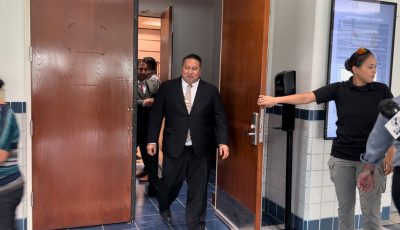High Court: Special position is protected only during term of appointing governor
The Commonwealth Supreme Court issued a ruling in Peter-Palican v. Commonwealth last Friday, June 29, 2012, addressing a question certified by the U.S. Court of Appeals for the Ninth Circuit.
The Ninth Circuit certified two questions to the Commonwealth Supreme Court: 1. Does Article 3, section 22 of the Commonwealth Constitution, which states that “[t]he Special Assistant may be removed only for cause,” mean that the Special Assistant may never be removed from that position without cause-even beyond the term of the appointing governor-or does it mean that the Special Assistant is protected against termination without cause only during the term of the appointing governor? 2. If the answer to the above question is that Article 3, section 22 of the Commonwealth Constitution means the Special Assistant may never be removed for cause even beyond the term of the appointing governor, does Commonwealth law imply a private right of action for monetary damages against the Commonwealth or its officials for violation of that section?
The dispute over Article 3, section 22 arose from the termination of Emerenciana Peter-Palican from her position as the Special Assistant to the Governor for Women’s Affairs in 2006. Gov. Juan N. Babauta appointed Peter-Palican, who was later given a letter of termination when the Fitial administration came to office. Peter-Palican contended that the Special Assistant enjoyed life tenure and could only be removed “for cause.” The Commonwealth contended that the Special Assistant’s term ended with the term of the appointing governor.
The Supreme Court first looked to the plain language of Article 3, section 22 and found that it does not specify a term of office for the Special Assistant. The High Court also examined the constitutional provision’s legislative history and concluded that it was insufficient to demonstrate that the Second Constitutional Convention delegates intended the Special Assistant position to have life tenure.
Because neither the language of Article 3, section 22 nor the legislative history behind it addressed the term of the Special Assistant, the High Court looked to interpretation of similar provisions by other courts. Many courts state that if the term of a public office is uncertain, courts should interpret the term of office to the shortest possible time. The High Court also noted that decisions from other jurisdictions will not allow a public official to appoint someone for a term that extends beyond the term of the appointing official. Applying these two rules to Article 3, section 22, the High Court noted that the provision does not specify a term of office for the Special Assistant. In the absence of any explicit language regarding a term of employment, the High Court held that the Special Assistant to the Governor for Women’s Affairs is protected against termination without cause only during the term of the appointing governor.
The Supreme Court’s full opinion is Peter-Palican v. Commonwealth, 2012 MP 7, and can be found at http://www.cnmilaw.org/supreme_12.htm. (CNMI Judiciary)



























